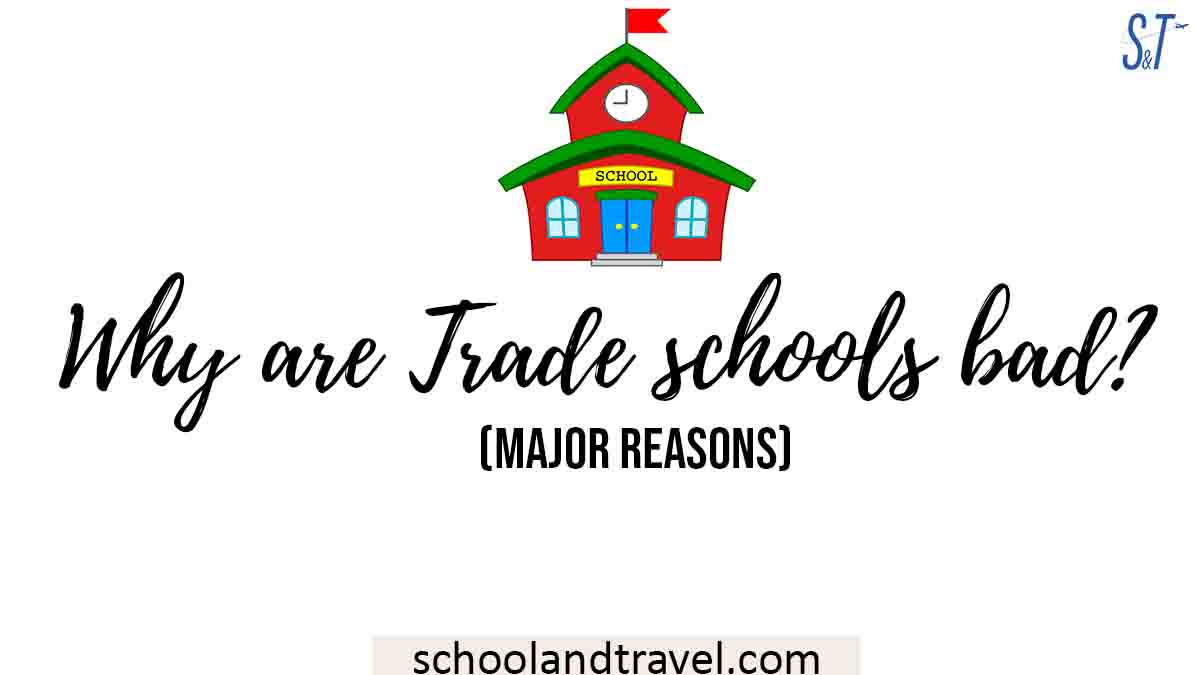The number of educational pathways in any given sector is huge.
Some individuals may study this field directly as a major, while others may combine a couple of degrees to become educated in that field.
Individuals often prefer to attend high school, eventually preparing them for college, after which they join the workforce.
However, some individuals may decide to fast-track their transition into the workforce by attending particular institutions that have gone by several names across the globe.
These schools are called “Technical Colleges” in Australia; in Canada, they go as “Colleges”; and in Central and Eastern Europe, as “Vocational Colleges or Schools.”
However, generally, these schools are, in simple terms, called “trade schools.”
What are Trade Schools?
A trade school is an educational institution designed to provide technical skills required to perform specific jobs.
It is essential to note the word “specific” because trade schools provide only job-specific training for students in a particular skilled trade. In contrast, academic schools produce students in professional discipline.
Although, since the 1990s, technical schools have tried to increase their scope to be similar to academic schools, it has also increased the percentage of people who graduate from trade schools.
Like every fast track, issues always make you question its adequacy. Let’s look at some of the inadequacies.
Why are Trade schools bad?
| Arguments Against Trade Schools | Detailed Explanation |
|---|---|
| 1. Limited Career Flexibility | Trade schools often focus on specific skills for particular careers. Graduates might find it challenging to change fields without additional training. |
| 2. Technology Disruption | As technology advances, some trades could become obsolete, leaving graduates with skills that are no longer in demand. |
| 3. Less Emphasis on Holistic Education | Unlike traditional colleges, trade schools might not emphasize broader educational subjects, potentially limiting a student’s overall worldview and critical thinking skills. |
| 4. Potential for Over-saturation in Some Fields | Popular trade programs can produce too many graduates for a particular field, making job placement more competitive. |
| 5. Upfront Costs | Some trade schools can be costly, and not all offer financial aid. Students might find themselves in debt without a guaranteed high-paying job. |
| 6. Limited Networking Opportunities | Universities often provide diverse opportunities for networking, mentorship, and alumni connections that some trade schools may lack. |
| 7. Potential Quality Discrepancies | Like all educational institutions, there’s variability in quality. Some trade schools might not offer the same level of training or resources as others. |
Why are Trade schools bad?
| Arguments Against Trade Schools | Detailed Explanation |
|---|---|
| 8. Less Room for Exploration | Traditional colleges offer students an opportunity to explore various subjects before settling on a major. This flexibility might be limited in trade schools. |
| 9. Lack of Campus Experience | The rich campus life of traditional colleges—clubs, events, sports—might be absent in trade schools, potentially limiting personal growth and experiences. |
| 10. Fewer Ancillary Services | Some trade schools might not provide services like counseling, career guidance, and tutoring that are often available in larger universities. |
| 11. Potential for Misleading Claims | Some for-profit trade schools have faced criticism for exaggerating job placement rates or salary expectations, leading to unmet student expectations. |
| 12. May Miss Out on Broader Skill Sets | Trade schools focus on specialized training, which might mean students miss out on acquiring broader skills like communication, leadership, or problem-solving. |
| 13. Less Recognition in Some Industries | Certain industries or employers might give preference to traditional degree holders over trade school graduates. |
| 14. Short-term vs. Long-term Gains | While trade school might lead to quicker job placement, long-term career growth and potential earnings might be more substantial with a traditional degree. |
| 15. Accreditation Concerns | Not all trade schools are accredited, which can affect the transferability of credits and the value of the certificate or diploma in the job market. |
| 16. Potential Stigma | Some people may still harbor biases against trade schools in favor of traditional four-year institutions, potentially affecting hiring decisions. |
Why are Trade schools bad? (Cons of Trade School)
1. Cost Factor:
Over the years, it has been observed that trade schools are usually more expensive when compared to academic schools.
This means that resources used to acquire a specific skill in a trade school would have been better used in developing diverse knowledge in academic schools.
Therefore, considering the cost of any trade school when you wish to attend is essential.
2. Limited Opportunities:
Most trade schools, if not all, are job- or skill-specific in training, thus limiting the students’ abilities to just one skill.
Due to this one-dimensional skill set, one can only be skillful in specific fields, reducing the opportunities to find jobs as their job horizon has been streamlined.
Read this: Is Work-study worth it? (Quick answer)
3. Knowledge Sharing Unavailability:
The knowledge possessed by students attending trade schools is limited, affecting their ability to share knowledge with others.
In academic schools, students learn various spheres of courses, hence making them more versatile. But students in trade schools are masters in just one aspect and empty in others, making trade school students handicapped.
4. Limited Flexibility:
Trade schools provide limited flexibility to their students if they, in the future, decide to venture into careers outside their field. This is because of the limited array of information/knowledge made available to them.
For this reason, trade schools are sometimes called the “concentrated education system.” In the case of a career-focused bachelor’s degree, an array of classes and experiences prepare you for a diverse career option.
5. Prevents Diversity:
Trade schools admit only students who desire to acquire the same or a particular professional skill.
This limits the students’ opportunities to meet people with diverse or different professional interests, thereby preventing the coming together of two professions to come up with a life-changing idea.
6. Limited Schools:
There is a limited number of trade schools across the globe. This limits the range of schools aspiring students can choose from.
This limitation also reduces the range of quality institutions in the trade school “niche,” as humans logically become lazy when there is no competition.
This lack of competition among trade schools eventually weakens the competitive nature of the students and staff.
FAQs on Why Trade Schools Are Bad
Trade schools, often known as technical schools, are post-secondary institutions that focus on preparing their students for work in certain skilled trades. For students to be truly job-ready, however, the most crucial thing that a trade school can provide is practical experience.
There are many examples of people who have become wealthy through stock trading or day trading, but to replicate their success, you’ll need to have a firm grasp of the market, an in-depth comprehension of key ideas, and a level head.
Conclusion:
Finally, some people may find trade schools as a fast track or “shortcut” to getting into the labor market and the workforce where they can start earning money.
However, it is essential to recognize that trade schools make us handicapped in various ways.
Anything worth doing is worth doing well, so if you acquire a professional skill, take the more diverse path, irrespective of how long or stressful it may seem.
Awesome one; I hope this article answers your question.
Read more:
- How to make Friends after College (Steps, Processes, FAQs)
- How to Make Friends as a Transfer Student (Reasons, FAQs, Steps)
- How to Make Friends as an Introvert in College
- 10 Actionable Steps to make Friends in your 20s.
- How long does it take to get a teaching degree?
- 25 Questions To Ask College Recruiters For Athletics (FAQs)
- How To Go Back To High School After Dropping Out (FAQs)
- 15 College Roommate Boundaries List (Meaning, FAQs)






